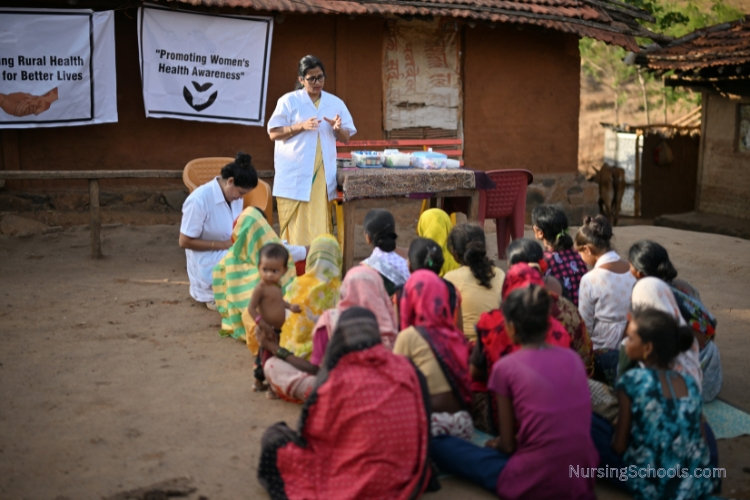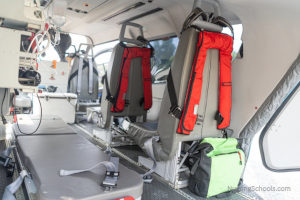Missionary Nurse
Healthcare Career Guide

Overview
What is a Missionary Nurse?
A Missionary Nurse provides healthcare services to underserved populations in domestic or international locations, often as part of humanitarian or faith-based missions. These nurses combine their medical expertise with a desire to serve others, addressing both physical and spiritual needs. Missionary Nurses often work in challenging environments where access to medical resources is limited.
Patients in need of a Missionary Nurse's care may include individuals in rural villages, disaster-stricken areas, or impoverished urban settings. Their responsibilities range from treating common illnesses to managing chronic conditions and educating communities about health practices. In addition to providing direct patient care, Missionary Nurses may also assist with building healthcare infrastructure, training local medical staff, and promoting public health initiatives.
This role is ideal for nurses who feel called to make a global impact by serving vulnerable populations. While the work can be physically and emotionally demanding, it is also incredibly rewarding for those passionate about service and healthcare.
Education
How Do I Become a Missionary Nurse?
Becoming a Missionary Nurse requires a combination of education, clinical experience, and a commitment to serving others. Here are the steps to pursue this unique and impactful healthcare career:
- Earn a Nursing Degree. Obtain an Associate Degree in Nursing (ADN) or Bachelor of Science in Nursing (BSN). A BSN is often preferred for missionary work, as it provides a more comprehensive education.
- Pass the NCLEX-RN. Successfully pass the National Council Licensure Examination for Registered Nurses (NCLEX-RN) to become a licensed RN.
- Gain Clinical Experience. Work in a variety of healthcare settings to build a broad skill set, particularly in areas like primary care, pediatrics, or public health.
- Learn a Foreign Language. If planning to work internationally, learning the local language can help build trust and improve communication with patients.
- Join a Missionary Organization. Partner with a faith-based or humanitarian organization that offers missionary nursing opportunities. Examples include Medical Teams International, Doctors Without Borders, and faith-based missions.
- Pursue Additional Training. Some missionary organizations may require training in cultural competency, disaster relief, or public health initiatives.
Depending on your education and experience, it can take 4 to 6 years to prepare for a career as a Missionary Nurse. This includes completing nursing school, gaining experience, and potentially learning a second language.

Average Salary
How Much Does a Missionary Nurse Make?
Salaries for Missionary Nurses vary widely depending on the organization, location, and type of work. In some cases, missionary work may be volunteer-based or supported by fundraising efforts. For paid roles, Missionary Nurses can expect to earn between $50,000 and $75,000 annually.
Average annual salary for a Missionary Nurse:
- Entry-level: $50,000 - $55,000 per year.
- Mid-career: $55,000 - $65,000 per year.
- Experienced: $65,000 - $75,000 per year.
It's important to note that many Missionary Nurses rely on donations or stipends from sponsoring organizations to cover their living expenses. For those working in volunteer roles, the intrinsic rewards of helping underserved communities often outweigh financial considerations.
Job Duties
What Does a Missionary Nurse Do?
Missionary Nurses perform a wide range of duties that may include clinical care, community outreach, and public health education. Their work often involves creative problem-solving and adaptability due to limited resources.
The most common job duties of a Missionary Nurse:
- Providing Primary Care. Diagnose and treat common illnesses and injuries, often in rural or remote locations.
- Administering Vaccinations. Run vaccination campaigns to prevent outbreaks of diseases like measles, polio, and hepatitis.
- Educating Communities. Teach individuals and families about hygiene, nutrition, and disease prevention.
- Assisting with Public Health Initiatives. Help develop and implement programs to improve access to clean water, sanitation, and healthcare services.
- Collaborating with Local Providers. Train and mentor local healthcare workers to build sustainable healthcare systems.
- Responding to Emergencies. Provide care during natural disasters, conflicts, or disease outbreaks.
- Advanced Duties. Experienced Missionary Nurses may take on leadership roles, oversee healthcare projects, or serve as liaisons between organizations and local governments.
Missionary Nurses work in diverse environments, from remote villages to urban clinics. Their job duties require adaptability, cultural sensitivity, and a strong commitment to making a difference.

Essential Skills
What Skills Does a Missionary Nurse Need?
Missionary Nurses need a broad range of skills to provide effective care in resource-limited settings. These skills include both technical expertise and the ability to connect with people from different cultures and backgrounds.
Here are some of the skills a Missionary Nurse needs to succeed:
- Cultural Competency. Understand and respect cultural differences to provide appropriate care.
- Adaptability. Work effectively in diverse and resource-limited environments.
- Clinical Proficiency. Deliver primary care, administer medications, and manage chronic conditions with limited resources.
- Communication. Clearly convey health information to patients, families, and team members, often in multiple languages.
- Problem-Solving. Think creatively to address challenges like limited supplies or remote locations.
- Emotional Resilience. Cope with the emotional demands of serving in high-stress or disaster-affected areas.
- Teamwork. Collaborate with multidisciplinary teams and local healthcare providers.
- Fundraising Skills. For volunteer-based roles, manage fundraising efforts to support mission work.
While the challenges of missionary nursing can be significant, the rewards are equally profound. Missionary Nurses often find immense fulfillment in knowing they are making a meaningful difference in the lives of individuals and communities.
Last updated: February 2, 2025
References:
- Registered Nurses. Bureau of Labor Statistics, U.S. Department of Labor. Occupational Outlook Handbook. Retrieved February 2, 2025.
- Missionary Nurse. Johnson & Johnson, Nursing Careers. Retrieved February 2, 2025.
- Missionary Nurse Opportunities. Reach Beyond, Faith Based Missionary. Retrieved February 2, 2025.
- Missionary Nurse Opportunities. CMDA Christian Medical and Dental Association. Retrieved February 2, 2025.
- Opportunities and Challenges in Missionary Nurse. Medical Missions, Missionary Opportunities. Retrieved February 2, 2025.
- Missions Degree Nursing Concentration. Appalachian Bible College, Academic Programs. Retrieved February 2, 2025.
- Nurse Salary at Missionary. Salary.com. Retrieved February 2, 2025.


